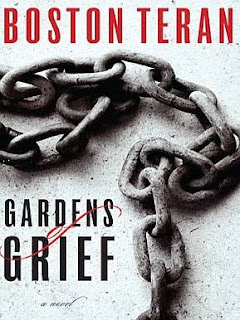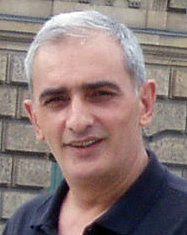 Boston Teran’s latest book Gardens of Grief is about the Armenian Genocide based on historical fact. It's set in Turkey 1915 – – a fierce retelling of events in 1915 Turkey seen through the eyes of a young American, an agent for the Bureau of Investigation and the U.S. State Department.
Boston Teran’s latest book Gardens of Grief is about the Armenian Genocide based on historical fact. It's set in Turkey 1915 – – a fierce retelling of events in 1915 Turkey seen through the eyes of a young American, an agent for the Bureau of Investigation and the U.S. State Department. Gardens of Grief, a sequel to Boston Teran's literary classic, The Creed of Violence, is not only a powerful and thrilling piece of literature, it is also a forceful condemnation of one of the most monstrous and controversial events of the twentieth century-the Armenian genocide. In 1915, Islamic fundamentalists in Turkey annihilated two million innocent Armenians. Were the atrocities committed by the Turkish government an unfortunate act of war, or the methodical extermination of a people that was unequalled in history up to that time? The novel has been compared to Hemingway's For Whom the Bell Tolls, where honor and bravery align with selflessness, to the impassioned advocacy for justice of Emile Zola's J'Accuse, the writer's 1898 open letter on the Dreyfus Affair, and to the work of Solzhenitsyn, for his treatment of the horrors of oppression.
About the Author:
Boston Teran became a literary sensation with a first novel God Is a Bullet. The winner of numerous international awards, the author has been compared to novelists such as Hemingway, Maupassant, and McCarthy, and because of a unique writing style, also compared to the painters Picasso and Bruegel, the composer Tchaikovsky, and filmmakers such as John Ford, Sergio Leone, and David Lean.
Boston Teran was born and raised in the South Bronx. He is the author of several books.

Universal Pictures bought one of Teran's recent books for $2.5 million. This book too might be a movie starring Kim Kardashian who wanted to make a film about the Armenian Genocide . .
Book Review
GARDENS OF GRIEF a brilliant, and socially important novel - is less a sequel to THE CREED OF VIOLENCE than an organic evolvement. It follows John Lourdes, an agent with the Bureau of Investigation, who is sent by the U.S. State Department to Constantinople in 1915. The Great War has begun and the British have been defeated at the Dardenelles. In Turkey the government means to see every Christian Armenian exterminated, in what will become the first genocide of World History. John Lourdes clandestine assignment is to help an outlaw priest named Malek get safely across the war-ravaged Ottoman Empire. The priest, hunted by the Turkish government because he is an Armenian, is a hero to his people and a political threat to the Central Powers.
The novel, very much a Homeric epic, has the sweep and grandeur of LAWRENCE OF ARABIA. It will be to modern literature what the great chanson de geste THE SONG OF ROLAND was to the Middle Ages. A parabolic and visceral tale of sacrifice and martyrdom. It is not only compelling human drama, but it is also rich with detail about what truly took place in Turkey in 1915. The book is the definitive battlefield for those who say the genocide did happen, and those who say it did not. Regardless, the book presents the horror and the grandeur, in Kiplings words, Lest we forget...
There are other aspects of this work I would like to draw your attention to. The first, the parabolic nature of the style in which it is written. Many of the characters are addressed not always by their proper names, but by their symbolic name...the priest...the guide...the dragoman (county politico and translator)...the captain...the German... This gives the players in the drama an archetypal feel, a kind of cross-cultural timelessness. They are also written in a manner for the reader to imbue each of these characters with their own set of internal meanings and feelings, their own iconography.
This leads me to my second point, which I believe will make the book hotly debated beyond the fact it has taken a dynamic stand on one of the most controversial events of modern World History. GARDENS OF GRIEF can be viewed through many political prisms. The parabolic and cross-cultural feel of it, especially when focused on the central character...the priest, Malek.... can be read and seen many ways.
The priest.. a political figure, willing to die to free his people, takes up arms to fight, has killed, has been put in prison, has been tortured, but refuses to yield, escapes to fight again, is a hero to his people, understands who he is and what he is doing. This could be a George Washington type of personage, or a Nathan Hale who called out before his hanging "Give me Liberty or give me Death". From another perspective he could be a Robespierre or a Che Guevara. He could be John Brown inciting a war to free the slaves, or a member of the IRA. He could be Emperor Constantine merging Christianity and the flag of Rome, or a militant cleric from the Middle East rallying his followers. Malek is the vanguard of every revolution that ever was, or ever will be. I could imagine a child reading about Malek then going off to fight at Lexington and Concord, or in war torn Africa, the war torn states of Eastern Europe, the endless war torn states of everywhere and anywhere. And in that GARDENS OF GRIEF is a cautionary tale, a means by which we can view political friends and enemies, and how they become both.
Without giving details away, the climax of the book, much like the central struggle and drama of THE SONG OF ROLAND, an intentional act of sacrifice, could also be called Thermopyle or Bataan, Masada or the 47 Ronin or the Battle of Saragarhi. It was meant to be that kind of universal moment, but something else, and something more.
And that something else, something more is detailed in one particular instant near the end of the book, when John Lourdes is looking out over a potential site for the final, strategic confrontation between their small group of Armenian citizen/soldiers and a much larger enemy force, and he thinks to himself... From the first brutal murders on the quay in Constantinople, to the bombing at the Armenikend, he had been witness to the future, and the stark barbarity that gave birth to it. He saw that a new level of infamy had been ushered into all their lives. And he understood, they did not have the makings for a long fight, so one single and terrifying act would have to be enough to exact their will.
When the author uses the words "one single and terrifying act to exact their will" he is reminding us all fights ultimately now can lead to a Hiroshima or a 9/11.
.













 Turkey to pay 100,000 Euros to Journalist’s Family
Turkey to pay 100,000 Euros to Journalist’s Family








